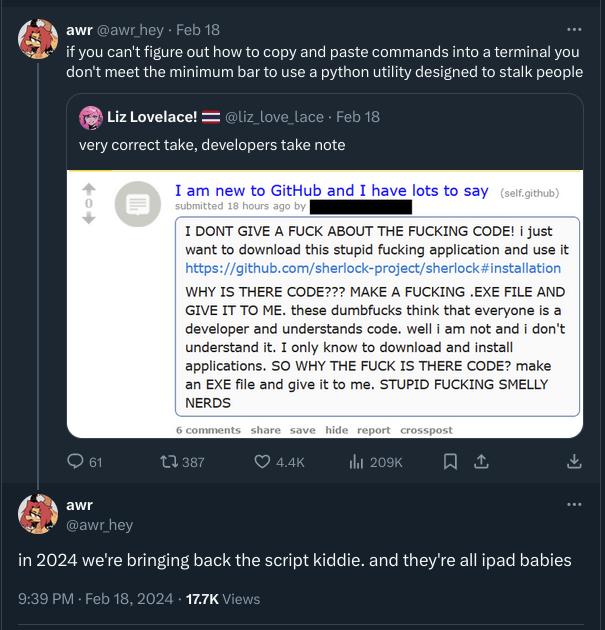this post was submitted on 20 Feb 2024
1129 points (97.2% liked)
Microblog Memes
5846 readers
1639 users here now
A place to share screenshots of Microblog posts, whether from Mastodon, tumblr, ~~Twitter~~ X, KBin, Threads or elsewhere.
Created as an evolution of White People Twitter and other tweet-capture subreddits.
Rules:
- Please put at least one word relevant to the post in the post title.
- Be nice.
- No advertising, brand promotion or guerilla marketing.
- Posters are encouraged to link to the toot or tweet etc in the description of posts.
Related communities:
founded 1 year ago
MODERATORS
you are viewing a single comment's thread
view the rest of the comments
view the rest of the comments

Making an installation script that will work for all, or even most, OSs and processor architectures can be a lot of work. Are you paying the devs to do it?
Because the more complex software is usually run by a bigger team, and has more funding.
And that's a problem, because the devs either have to make multiple versions - one for each OS version, processor architecture, dependency, feature set, etc. - or compromise and make a one size fits none solution. In contrast, if you provide the user the source code, they can ask their machine to compile it for their OS and architecture, including just the parts they want, without taking up unnecessary disk space or memory.
You mean, like the vast majority of scientific or technological software? A lot of it is written on python too, just like this package.
I do pay for my software, even when its free, when I like the software and the devs. But if the devs/community think they are something better, then no. I had some where they refused a install script and said something along the lines that if you can't get it running with the docs, you shouldn't host the software. Yeah I don't like such devs. Also when they have enough time to write a documentation, they have enough time to write a script. I even had one project, where the dev refused a correction in the docs, even though it was faulty.
Also you don't need to write a script for every system. You start with the most used ones. I mean just for testing I would get insane, when I have to repeat some steps over and over. At our company I do write scripts for some things that drive me insane. First I got told, it works this way, this costs too much time to do and it doesn't sell more software. I just did it and now they thank me for that. Even just an internal tool that I wrote for myself, after I drove insane doing stuff manually, now also customers get.
I don't speak about software where you pull via git, install some prerequisites and run a script. Not shipping prerequisites can have a legal reason and git pull is just a different way of downloading. It also works to download the tagged source code, instead of cloning but this requires more explanation to less skilled users.
Also with docker I came across some projects where they really butchered it. A docker compose file is my preferred way. I have my file + .env and it works for most containers I come across. It looks clean and feels clean. Running one command for creating a user is a understandable step, to avoid default users.
When you like to hammer in a lot of commands into a shell to install something, do it. I prefer my clean, simple and straight forward install scripts. I don't need a installation doc that goes over every customization that you can make. I want a setup that works for most users and after that, I can dig around every customization there is, to optimize a software how I want it. Not everything is needed right at start and a default value that most users will use, is enough for the start.
Good thing that there is a ton of software and I can pick the ones where I like their philosophy and support them. That is what I do.
To clarify, I'm not saying that devs shouldn't write scripts, just that they aren't obliged to. I too prefer having easy to install software. But the dev has given something they wrote for free, we aren't entitled to free support as well.